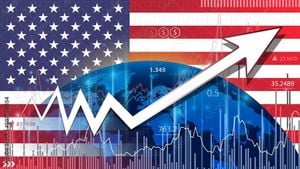Donald Trump's impending presidency is stirring up the political pot, particularly with his recently announced plans to impose significant tariffs on goods from Canada and Mexico. This decision, which Trump claims is aimed at combatting drug trafficking and unauthorized immigration, appears to be sending shockwaves through both countries and raising concerns about the potential economic fallout.
On November 26, the president-elect took to social media, asserting his intention to enforce 25 percent tariffs on imports from Canada and Mexico as soon as he takes office. His motivation? To curb what he described as the "invasion" of drugs and illegal immigrants facing the United States, particularly targeting substances like fentanyl. Trump emphasized, "Both Mexico and Canada have the absolute right and power to easily solve this long-simmering problem," indicating he expects those governments to take more stringent measures to address these issues.
Canadian officials, understandably concerned about the economic impact of such steep tariffs, have begun contemplating possible retaliatory measures. A senior government official admitted to exploring various options, but emphasized no decisions had been finalized yet. Economists warn such trade hostilities could trigger severe repercussions not only for Canada but also for the U.S., where both countries share significant economic ties.
Meanwhile, President Joe Biden urged Trump to reconsider the blanket tariff proposal, calling it "counterproductive" during his Thanksgiving Day comments. Biden stressed the importance of maintaining diplomatic and economic relations, remarking, "The last thing we need to do is begin to screw up those relationships." This statement reflects abiding concerns within the Democratic Party about the adverse ripple effects tariffs could create on both sides of the border.
Indeed, the stakes are high. Experts predict the tariffs could substantially escalate the cost of basic goods for consumers, with price hikes expected to be most pronounced for items such as gasoline, which is heavily imported from Canada. Estimates suggest gas prices could soar by as much as 30 to 70 cents per gallon, with broader inflationary pressures threatening to push the cost of living higher during what is already shaping up to be a challenging economic period.
Economists at Oxford Economics projected such tariffs might plunge Canada directly toward recession with inflation rates exceeding 7% and unemployment levels nearing 8%. Canadian Public Safety Minister Dominic LeBlanc responded to Trump's threats by announcing the government would invest more resources at the border to improve security and prevent unauthorized crossings. "We’ll continue to tighten the screws on this process," LeBlanc outlined, emphasizing the government's commitment to maintaining border integrity.
The border situation has heightened tensions between the U.S. and Canada. Although the number of illegal crossings between the two countries remains dwarfed by those at the southern border with Mexico—where Customs and Border Protection registered over 2.1 million encounters—Trump's focus on the northern border has raised eyebrows. US Agencies recorded nearly 199,000 encounters between October 2023 to September 2024, and drug seizures at the Canadian border have dramatically declined compared to previous years.
The Safe Third Country Agreement, which governs the handling of asylum claims at the shared border, has evolved recently, tightening the rules on crossings and allowing expedited removals of asylum seekers caught at unofficial points. Advocates argue this has forced many asylum seekers to take dangerous routes, leading to tragic outcomes, including instances of families attempting to navigate perilous situations amid harsh weather.
While Canadian lawmakers have mostly condemned Trump's tariff threats as harmful to their economy—warning of potential job losses and trade imbalances—there are factions within the Canadian government calling for stricter immigration measures. Ontario Premier Doug Ford suggested the federal government needs to take the border situation more seriously and even proposed retaliatory levies if Trump pushes forward with his tariffs.
Francois Legault, Quebec's Premier, has echoed similar sentiments, emphasizing the need for comprehensive solutions to control the border. Legault has requested the federal government develop and share detailed plans to limit unauthorized entries to avoid triggering tariffs.
The tension isn't solely bottom-line driven. Human rights advocates are voicing their concerns as well, stating Trump's narrative around migration and border security is alarmist and damaging. Julia Sande from Amnesty International Canada called for clarity around such rhetoric, stressing the dangers of conflated terminology surrounding asylum seekers and migrants with criminal activity. Experts highlight the importance of prioritizing humane treatment rather than capitulating to fearmongering.
Trump's apparent plan to take strong actions against perceived threats at the Michigan border reflects broader fissures within U.S. relations, especially with Canada. Historically, the two neighboring countries have enjoyed one of the world’s largest trading partnerships. Together, they share significant economic connections, particularly within the automotive and energy sectors. Recent tensions over tariffs could destabilize previous agreements and severely harm these industries.
Yet, it remains unclear how far Trump's administration will go and whether these tariffs will, as some economists predict, actually materialize to the levels he has suggested. Some analysts believe the integration between U.S. and Canadian markets may prompt Trump to amend his approach, considering the fallout various industries might endure as well.
Regardless of the outcome, the temporality of Trump’s first executive order presents the possibility for shifts as the administration settles and begins reevaluations of trade policy. There’s significant apprehension, especially among industries reliant on cross-border trade, as partners on both sides of the border brace themselves for what reckoning may come come January.



